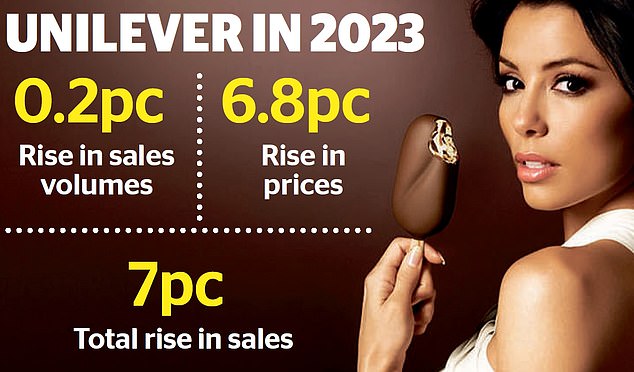The Unilever boss admitted there is “a lot to do” after another “disappointing” performance.
The consumer goods giant, whose brands include Marmite, Magnum ice cream, Domestos and Persil, said the volume of goods it sold rose just 0.2 percent last year.
However, total sales rose 7 per cent to £51bn, after Unilever increased prices by 6.8 per cent. Profits rose 2.6 per cent to £8.5bn.
“Our competitiveness remains disappointing and overall performance needs to improve,” said chief executive Hein Schumacher, who has vowed to transform the FTSE 100 firm after taking over from Alan Jope in July.
“We are in the early stages of this work and there is much to do, but we are moving quickly and urgently to transform Unilever into a consistently outperforming company.”
Struggling: Unilever, whose brands include Marmite, Magnum ice cream, Domestos and Persil, said the volume of products it sold rose just 0.2% last year.
An update that included the word “disappointing” four times revealed it has been hit by weaker demand amid strains on family finances.
Ice creams, including Magnum, Cornetto and Ben & Jerry’s, had an especially disappointing performance with volumes falling 6 percent.
European consumers opted for own-brand products from supermarkets at the expense of brands, Unilever said.
And only 37 percent of its companies were gaining market share, down from 48 percent at the beginning of the year.
But the stock rose 3.2 per cent, or 123p, to 4,024.5p – a four-month high – as investors welcomed positive developments such as the return of £1.3bn to investors at through a share buyback.
In the last three months of 2023, Unilever said the volume of goods sold was 1.8 percent higher than in the same period a year earlier. It was the first time in ten quarters that quarterly volumes increased.
At the same time, prices rose just 2.8 percent, the smallest increase since the beginning of 2021 and a clear sign that inflation pressures are easing. Price increases peaked at 13.3 percent at the end of 2022.
Its personal care division (brands such as Lynx and Dove) and beauty and wellness, which includes Vaseline, saw “strong” volume growth.
Jack Martin, portfolio manager at Oberon Investments, said the “main takeaway” was the buybacks “which have boosted” the share price.
He welcomed “solid” performance in the beauty, wellness and personal care divisions, but “particularly weak” ice cream sales could lead to speculation about the possibility of selling this business again.”
Schumacher defended Unilever against accusations of speculation and “counterinflation”, where the size of products is reduced but the price remains the same.
He said this could sometimes help shoppers, especially if the alternative was to keep items the same size and increase the price.
“I’m not saying inflationary contraction is a good idea,” he said. “I said it might make sense for consumers at a time when they are more cash-strapped.”
Unilever reduced its multi-pack of Magnums from four to three last March.
Amid growing pressure to restructure the company, including from activist investor Nelson Peltz, who is on the board, Schumacher is focusing on 30 “powerful” brands that account for 75 percent of revenue.
These include staples like Dove, Vaseline, and Ben & Jerry’s.
Schumacher also said he will stop “forcibly imposing” social justice messages on brands as he seeks to focus on sales and profits.
Two years ago, Unilever was criticized by investor Terry Smith for “ridiculous” virtue signaling.

